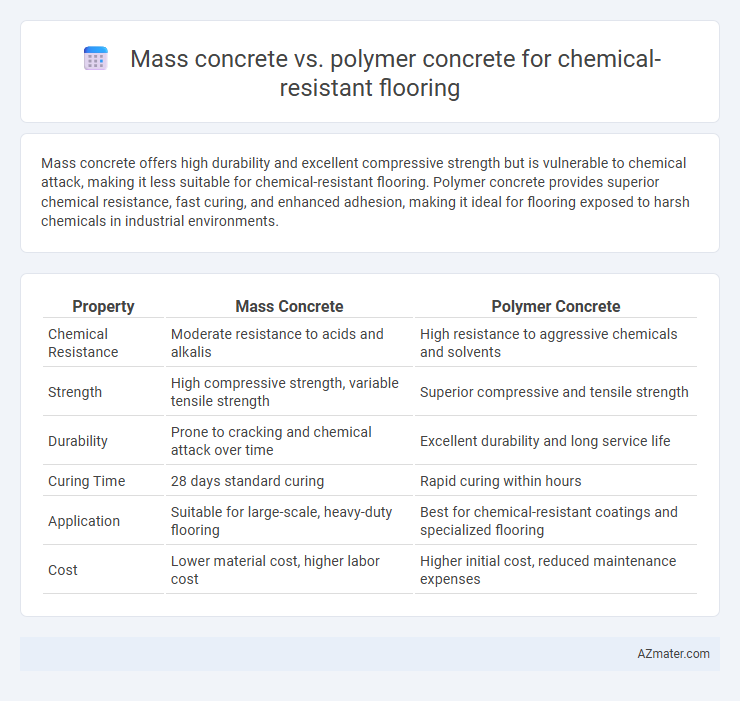Mass concrete offers high durability and excellent compressive strength but is vulnerable to chemical attack, making it less suitable for chemical-resistant flooring. Polymer concrete provides superior chemical resistance, fast curing, and enhanced adhesion, making it ideal for flooring exposed to harsh chemicals in industrial environments.
Table of Comparison
| Property | Mass Concrete | Polymer Concrete |
|---|---|---|
| Chemical Resistance | Moderate resistance to acids and alkalis | High resistance to aggressive chemicals and solvents |
| Strength | High compressive strength, variable tensile strength | Superior compressive and tensile strength |
| Durability | Prone to cracking and chemical attack over time | Excellent durability and long service life |
| Curing Time | 28 days standard curing | Rapid curing within hours |
| Application | Suitable for large-scale, heavy-duty flooring | Best for chemical-resistant coatings and specialized flooring |
| Cost | Lower material cost, higher labor cost | Higher initial cost, reduced maintenance expenses |
Introduction: Importance of Chemical-Resistant Flooring
Chemical-resistant flooring is essential in industrial environments exposed to harsh chemicals, ensuring safety and durability. Mass concrete offers high compressive strength but may suffer from chemical attack and degradation over time. Polymer concrete incorporates resins that enhance resistance to acids, alkalis, and solvents, providing superior protection against chemical corrosion.
Overview of Mass Concrete and Polymer Concrete
Mass concrete is a traditional construction material consisting mainly of cement, aggregates, and water, offering high compressive strength, durability, and cost-effectiveness for chemical-resistant flooring in industrial environments. Polymer concrete incorporates synthetic resins as binders instead of or alongside cement, providing superior chemical resistance, faster curing times, and enhanced durability against aggressive chemical exposure. The choice between mass concrete and polymer concrete depends on factors such as environmental conditions, chemical exposure levels, mechanical requirements, and budget constraints.
Chemical Resistance Properties Compared
Polymer concrete exhibits superior chemical resistance compared to mass concrete, effectively withstanding aggressive chemicals such as acids, alkalis, and solvents without deteriorating. The dense polymer matrix prevents penetration and degradation by corrosive substances, unlike mass concrete, which can absorb chemicals leading to surface erosion and reduced durability. Consequently, polymer concrete is preferred in environments requiring high resistance to chemical attack, including industrial flooring in chemical plants and wastewater treatment facilities.
Structural Strength and Durability Analysis
Polymer concrete exhibits superior structural strength and chemical resistance compared to mass concrete, making it highly suitable for chemical-resistant flooring in industrial environments. The polymer matrix binds aggregates more effectively, resulting in enhanced durability and reduced permeability against aggressive chemicals. Mass concrete, while cost-effective and robust under compressive loads, tends to suffer from micro-cracking and chemical degradation over time, compromising its long-term performance in corrosive settings.
Installation Process and Curing Times
Mass concrete for chemical-resistant flooring requires extensive formwork and longer curing times, typically 28 days, to achieve full strength and chemical resistance. Polymer concrete boasts a rapid installation process with curing times ranging from a few hours to several days, enabling faster project completion and reduced downtime. The accelerated curing of polymer concrete minimizes susceptibility to cracking and improves chemical durability compared to traditional mass concrete.
Cost Comparison: Mass Concrete vs Polymer Concrete
Mass concrete generally offers a lower initial material cost compared to polymer concrete, making it a more budget-friendly option for large-scale chemical-resistant flooring projects. Polymer concrete, while more expensive upfront due to specialized resins and additives, provides superior chemical resistance and durability, potentially reducing long-term maintenance and replacement expenses. Evaluating total lifecycle costs shows polymer concrete may offer greater value where aggressive chemical exposure demands enhanced performance.
Maintenance and Lifespan Expectations
Mass concrete flooring offers robust durability with moderate maintenance requirements but may be prone to cracking under chemical exposure, affecting its lifespan. Polymer concrete provides superior chemical resistance and lower maintenance needs, extending the floor's lifespan significantly in aggressive industrial environments. Choosing polymer concrete enhances longevity and reduces upkeep costs for chemical-resistant flooring applications.
Environmental Impact and Sustainability
Polymer concrete offers superior chemical resistance and durability for flooring applications, reducing maintenance frequency and waste generation compared to mass concrete. The production of polymer concrete typically consumes less water and energy while enabling the use of recycled resins and fillers, which enhances environmental sustainability. In contrast, mass concrete involves higher cement content, leading to increased CO2 emissions and resource depletion, posing greater environmental challenges over its lifecycle.
Ideal Applications and Industries
Mass concrete flooring offers exceptional durability and chemical resistance suited for heavy industrial environments such as wastewater treatment plants, chemical manufacturing, and oil refineries where high compressive strength and thermal stability are critical. Polymer concrete flooring excels in applications requiring rapid curing, superior corrosion resistance, and flexibility, making it ideal for pharmaceutical labs, food processing facilities, and electronics manufacturing cleanrooms. Both materials provide robust chemical protection, but polymer concrete is preferred for environments with aggressive chemical exposure and precise aesthetic or sanitary requirements.
Choosing the Right Material for Chemical-Resistant Flooring
Mass concrete offers excellent compressive strength and durability but may be less resistant to aggressive chemicals compared to polymer concrete. Polymer concrete integrates resin binders with aggregates, providing superior chemical resistance and faster curing times ideal for harsh environments. Selecting the right material depends on evaluating chemical exposure levels, required mechanical strength, and installation constraints to ensure optimal flooring performance.

Infographic: Mass concrete vs Polymer concrete for Chemical-resistant flooring
 azmater.com
azmater.com